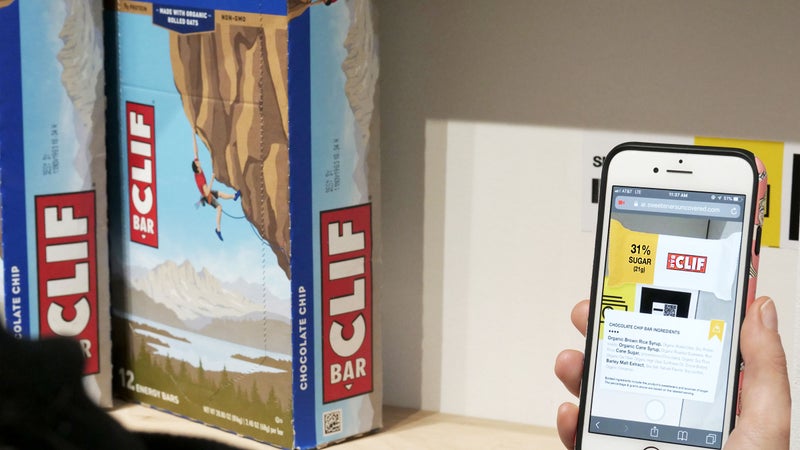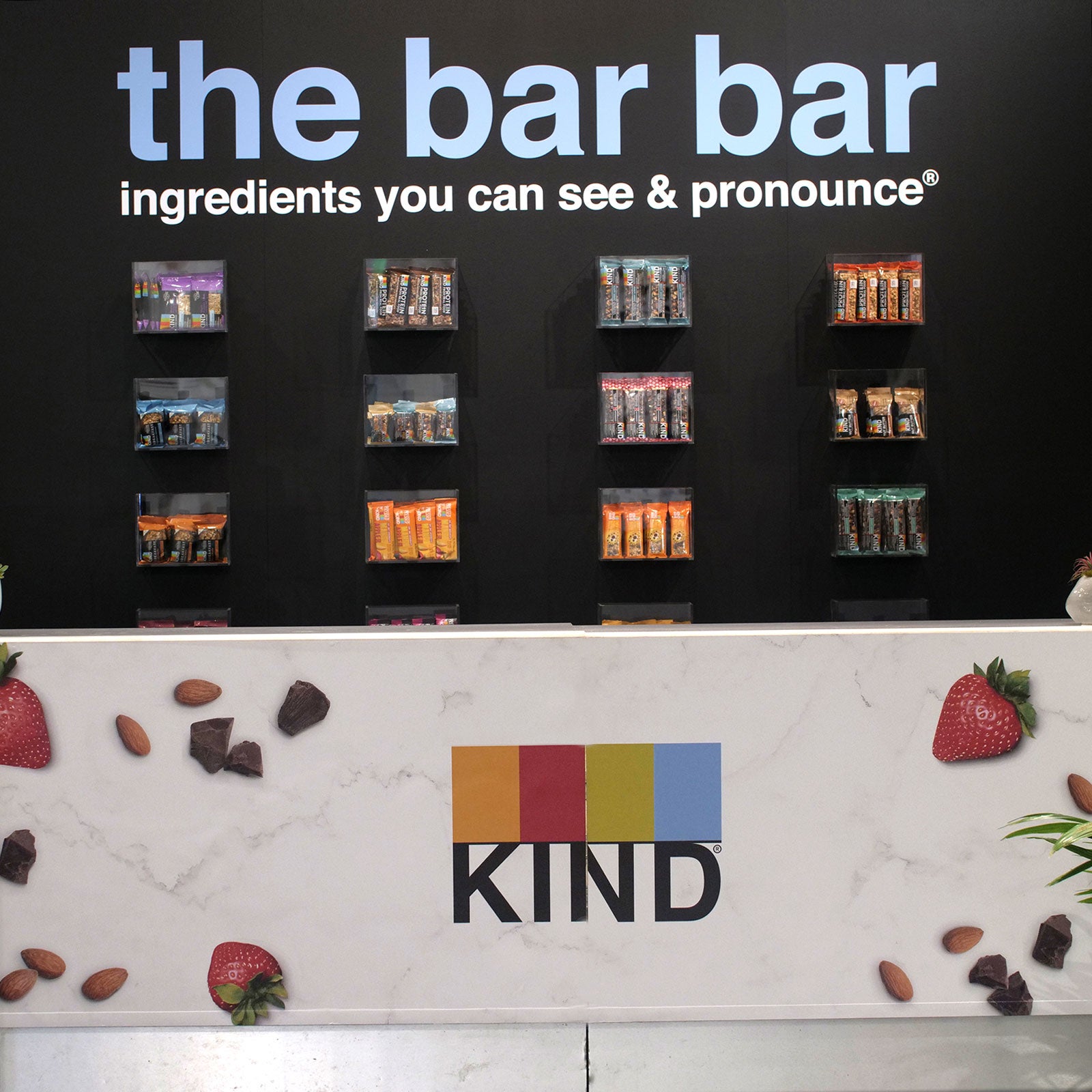Kind Snacks ╠řon╠řbar and cereal companies to be more transparent about the types and amount of sweeteners╠řthey use in their products. On Wednesday╠řthe company, which markets itself as using real, whole foods with a low glycemic index,╠řunveiled a the sugarsÔÇöboth added and naturalÔÇöused in popular bars, granolas, cereals, and yogurts╠řthat are generally considered╠řhealth foods. The site also pulls back the curtain on a litany of╠řartificial and natural sweeteners,╠řmany of which go unrecognized on nutrition labels (even if theyÔÇÖre included in the total gram count). This spans well-known╠řingredients like cane sugar, agave nectar, honey, and fruit concentrate, to lesser known ones like dextrose, xylitol, and muscovado sugar.╠ř
According to Kind CEO Daniel Lubetzky, the campaign is primarily an attempt to educate consumers. ÔÇťWe wanted to highlight packaged foods╠řthat are normally healthful,ÔÇŁ he says. ÔÇťBecause even in those categories,╠řyou also have products that are 30 to 40 percent sugar. People think that theyÔÇÖre eating something healthy but in fact theyÔÇÖre just eating sugar.ÔÇŁ Kind says it chose to highlight the top ten bestselling products in granola bars, nutrition bars, granola, cereal, and yogurt, including products by Clif Bar, Kellog, Larabar, Nature Valley, and RxBar, in addition to listing KindÔÇÖs own offerings. (While the classic Clif Bar comes in at 31 percent sugar and an RxBar at 25 percent, Kind boats 13 percent sugar.)
ÔÇťWhen you go to the ingredients list, you should be aware of the names of╠řsugar alcohols, artificial sweeteners, and the most popular names for sugar,ÔÇŁ says , a nutritionist who has consulted with Kind in the past and currenty works with the brand as an influencer. She adds that╠řfor most people, a zero-sugar diet is unnecessary. ÔÇťItÔÇÖs a matter of picking and choosing the places youÔÇÖre having it,ÔÇŁ she says,╠řÔÇťand not having it in all these hidden places.ÔÇŁ
Lubetzky says the site will remain live in perpetuity, as a national resource of sorts, but is unsure whether it might expand to include more brands or other food categories. ÔÇťWe might one day donate the site to a third party,ÔÇŁ he says, ÔÇťto manage it in a very nonpartisan way and decide how to continue fostering education.ÔÇŁ
(Notably, the campaign arrives a little over a month after Clif Bar ran a full-page ad in The New York Times challenging Kind, Larabar, and RxBar to transition to organic ingredients. Kind says its own╠řcampaign has been in the works for six months and is not a response to that advertisement.)
ÔÇťEvery ingredient in our product serves a purpose, helping create a delicious, nutrient-dense product,ÔÇŁ an RXBar spokesperson told ║┌┴¤│ď╣¤═°. ÔÇťThe sugar in RxBars is naturally occurring from real foods like dates and fruitÔÇöthere is no added or synthetic sugar.ÔÇŁ KindÔÇÖs website lists only one form of sugarÔÇödatesÔÇöin RxBars.╠ř╠ř

In an email to ║┌┴¤│ď╣¤═°, a Clif Bar representative argued that looking side-by-side at╠řits and KindÔÇÖs original╠řbarsÔÇöthe ones highlighted on the new wesbsiteÔÇöis ÔÇťlike comparing╠řapples an oranges,ÔÇŁ because the former is intended as an energy fuel and the latter is intended as a snack. ÔÇťA Clif BarÔÇÖs purpose is to sustain energy for activity with nutritious, wholesome, and organic ingredients like oats. When sugar is used, itÔÇÖs to provide taste and energyÔÇöwe look to match the amount of sugar to the amount of energy you need.ÔÇŁ The spokesperson also pointed out that Clif makes other products that are lower in sugar, like its Nut Butter Filled bars, which each have between nine and eleven╠řgrams of sugar, and a forthcoming line of Whole Lotta snack bars, which have no added sugar and will ship╠řto retail stores in May.
Melinda Manore, a professor of sports nutrition at Oregon State University who has consulted for Clif Bar in the past, says that the idea of a healthy bar versus an unhealthy bar is not as black-and-white as KindÔÇÖs website might imply. ÔÇťThereÔÇÖs a time and place for different kinds of food,ÔÇŁ she says. An athlete might need that high-sugar product to refuel in the middle of a long day.╠řAnd there are plenty of things to consider beyond sugar, too. For athletes, the type of carbohydrate is just as important as the amount. ÔÇťBecause Kind bars are fairly high in nuts, which digest more slowly than other carbohydrates, IÔÇÖm asking, How quickly do you need this in your bloodstream?ÔÇŁ Manore says. While she advocates for whole foods whenever possible, sometimes faster-burning sugars have their place.
Ultimately, itÔÇÖs the snacking portion of the population that KindÔÇÖs campaign is most concerned with. Lubetzky admits that╠řfor serious athletes, a carbohydrate-rich product is probably appropriate. ÔÇťBut 99╠řpercent of situations where people are buying nutrition bars, theyÔÇÖre not running a marathon,ÔÇŁ he says. ÔÇťTheyÔÇÖre eating it as a snack or after an average workout.ÔÇŁ Of course, Manore says, the single best thing a person can do is to snack on real food instead of packaged barsÔÇöeven Kind bars, with their whole nuts, grains, and dried fruits arenÔÇÖt as good as eating, say, an apple or a handful of almonds.╠řÔÇťSince 70 percent of our population is overweight or obese, they donÔÇÖt need any of this stuff,ÔÇŁ says Manore. ÔÇťThey donÔÇÖt need a snack bar, they need a piece of fruit.ÔÇŁ (Manore adds that this is only the case for snacking. She sees high-carbohydrate foods as important fuel for all athletes during exercise, regardless of weight.)
And Kind is not trying to tell consumers to avoid sugar at all cost. ÔÇťWe are not advocates of demonizing sugar,ÔÇŁ Lubetzky╠řsays. ÔÇťWe are advocates of demonizing deception and misleading claims.ÔÇŁ


